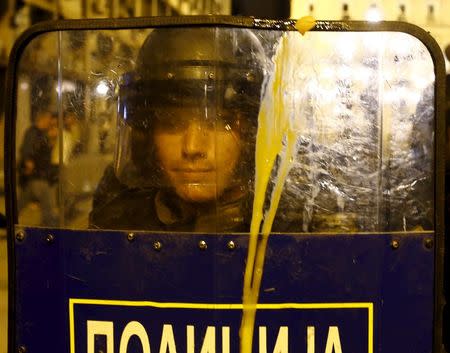Macedonian president halts wiretap inquiry, opposition brands move a 'coup'

By Kole Casule SKOPJE (Reuters) - Macedonian President Gjorge Ivanov ordered a halt on Tuesday to all criminal inquiries into allegations of a vast government wiretap operation, prompting the opposition to demand his resignation for a move it said amounted to a "coup d'etat". Macedonia, a poor Balkan country of two million people on the front line of Europe's refugee crisis, has been in turmoil since the opposition accused then-Prime Minister Nikola Gruevski and his counter-intelligence chief in February last year of orchestrating the wiretapping of more than 20,000 people. Ivanov's decision on Tuesday to shelve all investigations into the scandal, an action also sharply criticized by the European Union as contrary to the rule of law, looks set to compound rather than ease the crisis. "I have decided to put an end to this agony for Macedonia," Ivanov told reporters, announcing he would sign a decree bringing a halt to all legal proceedings against politicians over the wiretap allegations. Opposition Social Democratic leader Zoran Zaev, who made the original allegations, rejected Ivanov's decision as a "coup". "We want Gjorge Ivanov to resign. If he doesn't do that, he will lead the state to the brink. This today is a coup d'etat. We will use all tools that we have to stop it," Zaev told a news conference, adding that he would call for a protest against the decision. Several hundred protesters gathered soon afterwards, throwing eggs at Ivanov's office and ruling party headquarters and pushing and shoving with police. The EU commissioner in charge of relations with would-be member states, such as Macedonia, condemned Ivanov's decision as contrary to the rule of law and questioned whether a general election planned soon could be credible. The EU's Johannes Hahn said recent actions by the Macedonian leadership had jeopardized the former Yugoslav republic's prospects of closer relations with the EU and NATO. EU DEAL The opposition released a slew of phone-taps last year that they said had been made by allies of Gruevski and which it said exposed government control over journalists, judges, public sector recruitment and the manipulation of elections. Ivanov is an ally of Gruevski, who backed the president's election, though the president's powers are limited under Macedonia's parliamentary system. The EU brokered a deal with Macedonia under which a special prosecutor was appointed to investigate the revelations and Gruevski agreed to an early election, now expected in June. The opposition has already pledged to boycott the election. The special prosecutor launched criminal proceedings in February against two former ministers on suspicion of intimidating voters. Gruevski and his center-right VMRO-DPMNE party denied any wrongdoing. Shortly before he aired the wiretapping allegations last year, Zaev was charged with conspiring with an unidentified foreign intelligence service to topple the government. It was not immediately clear whether Ivanov's decision to halt all criminal proceedings applied to Zaev, but the opposition leader said that, in any case, he would reject such a step. "I neither ask for nor will accept amnesty," he said. "We are not all the same and we are not all criminals." Ivanov said he was intervening because the long-running crisis had seriously damaged Macedonia, which closed its border in March to thousands of migrants hoping to reach northern Europe, leaving them bottled up in Greece. "Politics (has) turned itself into who will open more criminal proceedings or submit criminal charges against one another," Ivanov said. "The thing is so tangled up that nobody can untangle it." Arsim Zekolli, a former Macedonian ambassador to the main European security and rights watchdog OSCE, told the Balkan Insight news website that Ivanov's decision was to be expected "in a country where it is common knowledge that it is run by one political party and where crime and corruption flourish." "We have no parliament, no judiciary and a police controlled by a political party...This is indescribable,” Zekolli said. (Additional reporting by Aleksandar Vasovic in Belgrade and Alastair Macdonald in Brussels; Writing by Adrian Croft; Editing by Mark Heinrich)

